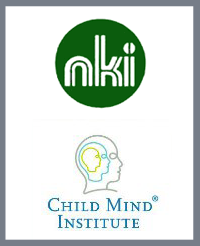Accessing the Full Phenotypic NKI-RS Releases¶
Data Usage Agreement¶
As stated in the data access overview, the full phenotypic releases of the Enhanced NKI-RS Sample require a data usage agreement – a requirement similar to efforts such as the Alzheimer’s Disease Neuroimaging Initiative (ADNI) and the National Database for Autism Research (NDAR). The adoption of a data usage agreement is not intended to limit the specific analyses a researcher can perform; users will only need to specify the broad range of analyses they may pursue with the data (e.g., association studies between DTI, R-fMRI, and behavior), not a specific analysis or set of analyses. The intent of the agreement is to ensure that data users agree to protect participant confidentiality when handling data that contains potentially identifying information and that they will agree to take the necessary measures to prevent breaches of privacy. The specific agreement to be employed for the Enhanced NKI-RS are those previously defined by the New York State Office of Mental Health, and can be found in the Data Usage Agreement (DUA).
Unlike the NDAR agreement, institutional review board (IRB) approval is not required for transfer of the data; it will be up to the individual data user to satisfy any additional requirements specified by their local IRB or ethics committee, prior to using the NKI-RS. Given that local IRB approval is not required as part of an individuals application for access to the NKI-RS, there is no need for an individual’s IRB to have a federal-wise assurance number – which can limit recipients of the NDAR datasets.
For your convenience, the DUA is already completed in its entirety with NKI-approved text for data handling. Investigators simply need to:
- Download the DUA form.
- Review all contents.
- Provide appropriate information regarding their name(s) and institution.
- Have the document signed and notarized by the appropriate institutional representative.
- Scan and send us the document.
- When your application has been received and approved, you will receive an email confirming your ability to request all phenotypic (single-item and summary) and imaging data in the Longitudinal Online Research and Imaging System (LORIS) Database or the Collaborative Informatics and Neuroimaging Suite (COINS) (see descriptions below).
Note: If your institution requests any clarifications regarding the DUA, just contact us and let us know – we are happy to work with them.
Accessing Phenotypical Databases¶
After receiving the DUA, you may access the full phenotypical data through two database portals, LORIS or COINS. Contact us if you have any issues accessing LORIS or COINS.
As of December 2019, we reorganized the NKI-RS dataset across all contributing studies to facilitate ease of data handling for either individual study or aggregate data exports within the LORIS database: Rockland Sample LORIS database. Instructions on how to access phenotypic data though LORIS can be seen here. Note, direct links to the MRI images in the AWS S3 bucket in BIDS format can be easily obtained through LORIS.
We recommend using only one point of access (LORIS OR COINS), however, if you need to compare across exported data the coding in LORIS can be mapped to COINS exports using a crosswalk downloaded from this link.
Instructions on how to use the COINS database can be seen here. Please note that data released from both database portals are identical, however, due to filtering differences COINS exports may show less than expected data at times.
Study Codebooks¶
All phenotypic data is available from either database portal (LORIS/COINS). In LORIS, variable names and short descriptions can be downloaded based on your selected export file. In COINS, a static codebook can be downloaded from the website but we recommend using the one found here, updated and formatted for ease of use. The NKI-RS Codebook includes LORIS and COINS variable names (there are some slight variations). This reference can also be used for LORIS - COINS variable mappings, if needed to reconcile COINS exports with LORIS exports.

